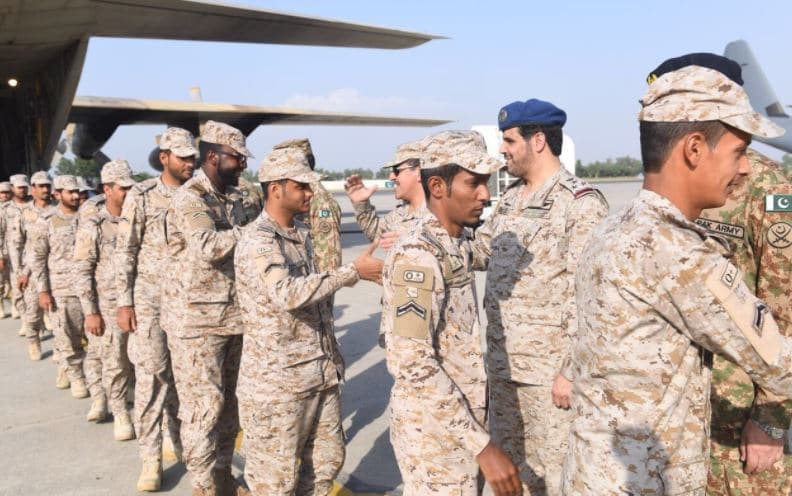2290Views 20Comments

Media outlet reports possible air defence deal between Pakistan and Thales
Abhinandan Mishra of the Sunday Guardian Live has reported that the French electronics giant Thales is in talks to sell an air defence system to Pakistan.
Citing an unnamed source, Mishra writes, “an ‘in-principle’ deal was … approved between the Pakistan government and Thales to provide air defence system to Pakistan, which will be designed keeping the ‘India threat’ in mind.”
Notes & Comments:
The prospect of Pakistan dealing with Thales is plausible considering that Thales still considers Pakistan an attainable market for its solutions, hence its participation at the 2016 International Defence Exhibition and Seminar (IDEAS) in Karachi in November. As per IHS Jane’s, Pakistan could spend $12 billion U.S. over the next eight years on arms procurement; although small in comparison to India, the outlay can still be a lucrative revenue pool for some vendors, including the likes of Thales and MBDA.
Although Mishra’s report is not yet verified, it should be noted that Pakistan’s agreements to negotiate – i.e. ‘letters-of-understanding’ (LoUs) – have generally been, at least during IDEAS, opaque and low-key.
For example, the LoU between Pakistan Ordnance Factories and Česká Zbrojovka does not detail the exact specifics of what POF is negotiating for in terms of small arms. Likewise, the attention surrounding that LoU has been quiet in comparison to the final agreements, i.e. memoranda-of-understanding (MoU), signed by Heavy Industries Taxila and Pakistan Aeronautical Complex with Ukraine and France, respectively.
In other words, Mishra’s report is certainly plausible considering the circumstances. In terms of the nature of what Pakistan could be pursuing from Thales, that is not known.
The “India threat” element indicates that the solution would be channeled to strengthen Pakistan’s capacity for addressing external conventional threats.
Thales’ air defence product catalogue comprises of the following:
- GROUND Master-200 and Master-400 air surveillance radars;
- RAPID very short-range air defence (VSHORAD) systems;
- SKYVIEW C4I system;
- SHIELD air defence system, can be integrated with various third-party solutions;
- STAR SHORAD and VSHORAD system;
- CONTROL air defence management system.
Pakistan’s air defence requirements could land any one – or multiple – of those areas, hence it is difficult to determine the probable scope of its dealings with Thales. It will be worth observing exactly which one of Pakistan’s service arms is negotiating with Thales. For example, in the case of the Pakistan Army, then the focus could be on SHORAD and VSHORAD solutions, particularly mobile systems to defend armoured formations or forward bases, respectively. If it is the Pakistan Air Force, the scope could be focused on finding a successor to the Siemens MPDR. If Thales is dealing with the Pakistan Navy, then the focus could be on sensor and command and control systems for use on an existing or future surface warship. An air defence solution beyond SHORAD would necessitate a munitions vendor such as MBDA.
Post-Note:
With the Pakistan Air Force (PAF) searching for a helmet-mounted display and sight (HMD/S) system for the JF-17 Thunder, the prospect of the Thales TopOwl-F being a choice is plausible. Currently, China does not have a marketable HMD/S product (though a system for the FC-31 is under development). There are scarcely few other options available on the market at this time other than the Thales TopOwl-F and, less plausibly, the BAE Striker II. An open channel with Thales could be a factor in this respect.



20 Comments
by Matthys Jacobs
If Pakistan ever wanted to build their own Radars, perhaps they should approach Reutech.
Several Navies use their services.
by Sami Shahid
Nice article…I hope Pakistan will be able to find a better HMD/S system for JF-17’s. Anyway, other than Aircrafts Pakistan should also focus on Long Range Surface to Air Missiles rather than radars.
by Andrei Romanov
Iran just made BAVAR-373 air defense system on their own. Pakistani engineers belongs to the same race of Iranian so-
I would say Pakistan have the power to develop their own Air defense system.
I can not bet on Indian defense engineers because most of them belongs to South India and usually they make their Equipment with help of Israelis.
by amar
Hi my dear Andrei Romanov,
It is correct though that a lot of scientists at DRDO are from south but passing a sweeping remark that ‘most’ are from south is certainly a far cry from reality. The second statement that DRDO develops equipment in collaboration is also partially correct.The reason being,only recently has DRDO partnered with israelis in developing their weapons.Most notably the Barak-8–wherein the propulsion was designed by DRDO and guidance system and radar designed by IAI. Even in this case too,israelis are very protective of their intellectual property rights. They rarely transfer the critical “know how”.By know how I mean various critical technologies where india is still evolving. They however let india license produce such “critical systems” in the country. Unlike a lot of countries including pakistan,indian defence research has been very transparent and there are various very stringent and autonomous agencies to audit the performance of DRDO.
Designing an indigenous high tech-top of the line air defence system isnt as easy as you think my friend.It requires research at many fronts.If you think pakistan can do it because iran somehow managed to reverse engineer S-300,then you are way way off the mark.
To design a guided missile something like this one would need-
1)A very potent radar system–one that can detect and track a LOT of air targets–much more than an airborne radar of a fighter. With the advent of modern AESA radars,particularly those involving beam forming in digital domain one can literally furnish individual beams from individual antennae elements.For instance DRDO’s Arudra and Ashwin radar system employ DIGITAL BEAM FORMING and can track more than 200 targets at the same time.Tracking a lot of targets at any given time locks up your processing resources that could have been better utilized for something else like maybe communications,jamming etc.Because when you track a target you’ve to constantly keep update of the target.
2)A sophisticated guidance and control mechanism.Now the sophistication stems from both hardware and software. Again there are no concerted efforts to suggest pakistan has designed her own miniaturized active seeker or an IIR seeker.There are a very stringent weight and power requirements that one needs to adhere to.
This is augmented by software algorithms that actually do wonders! A complex guidance methodology–one involving PN or PN+LQR or PN+Non Linear Dynamic Inversion is brought to bear for effective results.
3)Propulsion.
4)Structure and Aerodynamic layout of the missile.
by amar
https://uploads.disquscdn.com/images/d1c26efa4a785d08240ef51d2acf85edae7bd7167201ea4dadf2bacc1121d559.jpg https://uploads.disquscdn.com/images/a0d188e3895e5aecc96aec6fc39fab4058fc66c0f769f2cf91faddcc02697f1a.jpg
by Headstrong
The one thing that can be certain is that once Pakistan get their hands on Western technology, it will find its way to China in quick time for reverse engineering. I’m sure Thales would have factored that into their pricing, if indeed such a deal is in the offing
by Bilal Khan
“Certain?” Let’s not try presenting opinion as facts, please. I can understand Pakistan shipping Tomahawk wreckage, especially if said wreckage came as a result of the U.S. trying to strike Pakistani territory. But to suggest that Pakistan would willingly violate legal service terms and wreck another company’s IP? You should provide actual proof before saying it is “certain.”
by Headstrong
The Tomahawk issue came up when one landed in Pakistan when intended for a target in Afghanistan – not ‘Pakistani territory’. This in the aftermath of the 9/11 attacks – why would the US target Pakistani territory? But the alacrity with which said wreckage was shipped to China only signals to the rest of the world Pakistani (and Chinese) intentions. You admit it as much, justifying possible breaches as a result of sanctions.
The same is supposed to have happened post the Abbottabad raid – though that one, of course, was ‘uninvited’.
by Bilal Khan
Tomahawks had crashed in Pakistan prior to 9/11 in the late 1990s. Anyways, I’m not sure if uninvited wreckage falls under the purview of IP ownership protection. How can someone say that Pakistan’s disregard for the former would inform its acceptance (or lack thereof) of a legally binding agreement it’d sign with a supplier? You’d need proof before saying it is a “certain thing.”
Supplier worries are one thing, which is fair considering the close nature of Pakistan’s relationship with China, but taking precautions (e.g. maintaining a strong communication channel with Pakistan, posting personnel on-site, etc) in that regard doesn’t necessarily mean that Pakistan will assuredly violate terms of service if given the chance. Sure, sanctions could push in that direction, but at that point, would anyone expect the end-user to respect IP? That’s an exceptional circumstance. But in normal times, what proof do we have that Pakistan will disregard its legal contracts?
by Shakeel
Do you think that the Asia Pacic countries, especially China have no propensity to innovate.Your Intellectual property rights assumption is ‘delusional at best’.
by Andrei Romanov
First thing Amar , Bavar-373 was made before S-300 delivered to them so no question of Reverse engineering.
And second I am perfectly right when saying about- No Indian Defence equipment can be made out without help of another country and South Indian engineers
can not even reverse engineer the products.
Don’t question Iranians they have power to make nukes anytime.
by Andrei Romanov
Do not try to defend USA
All of us here we know what USA does in Pakistan.
by Headstrong
‘Taking precautions’ is exactly what I had mentioned in my first comment. As for proof, no amount will satisfy those who do not want to hear. I can only relate to what I hear within the industry. For example, all through the first decade of this century, I know for a fact that both South Africa and Spain refused to sell any product with IR technology to Pakistan precisely because China was looking to up their game in the field.
by Headstrong
China can certainly ‘innovate’, alright – and none more than in the field of reverse engineering!
by Steve
No no, only DRDO and Tata can innovate as everything they make is “indigenous”
by Shakeel
Self-infatuation, based on deceit & lies can surely not be in the interest of of certain individuals. My new friend Andrei is a victim of this vulgar behaviour.We all appreciate his input.
by Shakeel
Keep your ideas coming in Andrei. You already have a cult following.
by Andrei Romanov
Thanks bro
your praising is really appreciated.
by Andrei Romanov
Thanks bro i was bit embarrassed by these people But now I came back with full energy.
Thanks for your Inspirational Words.
by Omar
lol you and your expertise. Like bilal said “Let’s not try presenting opinion as facts”, those opinion judging from your previous comments seem to be wishful thoughts more or less aimed at just saying something negative which is fine but at least try to make a solid argument.